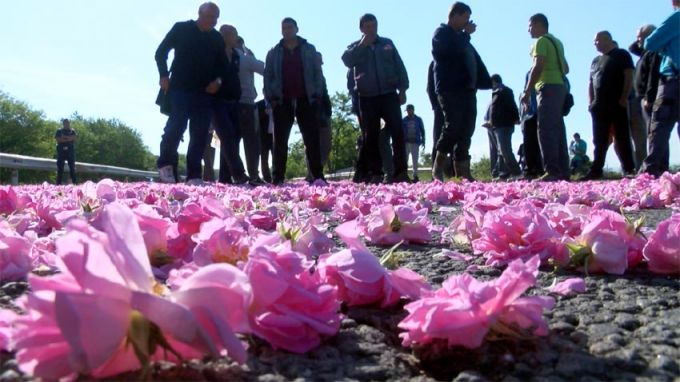
One of the first things foreigners learn about Bulgaria is that this country is popular as the land of roses and rose oil. Moreover, a whole valley in South Bulgaria was named the Rose Valley.
However, apart for being used for tourism advertising, oil-yielding roses are also used in industry for the manufacture of rose oil. Production of rose oil in Bulgaria is based on the cultivation of the Rosa damascena sort. The first evidence about the cultivation of the oil yielding rose on Bulgarian territory dates back to the beginning of the 18th century. Rose oil is popular worldwide and all popular cosmetic and perfumery companies use Bulgarian rose oil to manufacture high-quality products.
However, the situation of the Bulgarian farmers cultivating oil-yielding rose oil is not rosy at all. Rose growers are most affected. In the heat of the season they wake up at 5 am and pick the rose blossoms by hand. Harvest this year is excellent, but most rose producers are on the verge of bankruptcy and insolvency, because of the very low purchase price of their produce. In the first days of the rose-picking campaign the price of the Bulgarian oil-yielding rose amounted to EUR 1.50 per kilogram. The rose growers were quite upset by the low purchase price of their produce, because in their words they were not even able to cover their production costs. As a result, they launched street protests and started to block first class roads in their area. In the course of the crisis, Bulgaria’s Minister of Agriculture and Food Rumen Porozhanov tried to help the Bulgarian rose growers. However, the purchase prices of the Bulgarian oil-yielding rose plummeted to EUR 0.60 per kilogram. A kilogram of Bulgarian rose oil is sold for EUR 5,000-6,000 on the international markets.

Who can help the Bulgarian farmers get fair prices for their produce? The Bulgarian cabinet does not have mechanisms to influence market prices. Registered rose producers will be compensated with de minimis subsidies for the low purchase prices of their rose blossoms, Minister Poroshanov promised in the town of Karlovo. The rose-growers themselves do not have dominant position in their talks with the wholesalers, because they have to sell urgently their rose blossoms. If they keep their produce unsold for too long, the oil content in the rose blossom falls sharply and roses cannot be used by the oil distilleries for manufacture of rose oil. On the other hand, wholesalers are trying to reach the lowest price of rose blossom, because they do not want to pay for a product which perishes so quickly. Bulgaria’s Ombudsman Maya Manolova and some experts did not rule out the possibility of a cartel in the sector, which contradicts the principle of free competition. But even if it is so, it is very difficult to prove the existence of a cartel agreement and would take a lot of time. However, the Bulgarian rose growers cannot wait, because their rose produce is perishing. Apparently, the Bulgarian farmers cultivating oil-yielding rose will not gain any profits whatsoever in 2018.
However, the authorities must do something to keep Bulgaria’s image and avoid bankruptcies in this sector. This will perhaps happen through amendments to the current legislation which would set minimum purchase prices of the rose blossom. The Bulgarian rose growers approve and support this idea, but warned that if things happen too slowly, rose growing and rose oil manufacture may remain only a good memory.
English version: Kostadin Atanasov
Financial and tax stability has been shaken in recent years so it is good that a government has been formed, said Vasil Velev, chairman of the Bulgarian Association of Industrial Capital, at a joint press conference of employers. "Romania was..
The Ukrainian parliament has authorized the purchase of two Russian nuclear reactors from Bulgaria, Euractiv reports. The energy committee of the Ukrainian parliament greenlighted the purchase of two old Russian nuclear reactors to expand the..
Inflation for 2024 is 2.2% compared to the previous year, the National Statistical Institute reports. In December, this indicator was 0.4%. Annual average inflation for the period January 2024 - December 2024 compared to the period January 2023 -..
Bulgaria has favorable climatic conditions for producing electricity from the su n, even in the transitional seasons of spring and autumn. One of the..
A Bulgarian-Greek Business Forum with the participation of nearly 60 companies from both countries has opened today in Sofia . The forum is organized by..
A Bulgarian-Ecuadorian Business Forum will be held in Bulgaria, jointly organized by the Bulgarian Chamber of Commerce and Industry and the Pro Ecuador..

+359 2 9336 661
